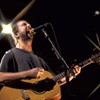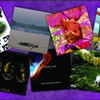Published November 17, 2004 at 5:00 a.m.
When Jethro Tull frontman Ian Anderson dies, he expects an "ascent to heaven, on a stairway flanked by Page, Plant and all the members of Spinal Tap." While that day probably won't happen anytime soon, the 57-year-old rocker will certainly have earned it.
Formed in 1968 and named after an obscure 18th-century agricultural pioneer, Jethro Tull are one of the most distinctive British rock groups of all time. Their potent blend of Anglo-folk, blues and flute-driven hard rock has earned them a place among the greats of their generation.
Tull have chalked up more than 2500 gigs in 40 countries in their three-decade career, and the band's concert on the Flynn MainStage this Thursday is sure to please long-time fans.
Anderson's dry wit, uncompromising views and iconic live presence make him a dynamic individual both on stage and off. A salmon farmer, wildcat preservationist and armchair historian, he's not the drug-addled, Porsche-crashing English rock star you might expect. In fact, he's never tried drugs -- although he admits a fondness for hops and curry -- and has yet to take his driver's test.
Seven Days spoke with Anderson in late October from his home in southwest England.
SEVEN DAYS: You're probably the most prominent flautist in rock, yet you're proficient on a variety of stringed instruments. What did you start out on?
IAN ANDERSON: The Elvis Presley plastic ukulele that I bought for 22 shillings and sixpence, in old English money. I think I was 8. It was a perfectly horrible instrument, but it did have a picture of Presley on the side of it. I suppose at least half of the value of the thing was in the propaganda/merchandising machine that existed even then... but I did learn some rudimentary chords.
I got an electric guitar by the time I was 17 and started playing blues. From there it was all downhill, because I heard Eric Clapton and realized I was never going to be as good as him. I figured I'd better find something to play that Eric Clapton couldn't.
SD: Did you have any formal training on woodwinds?
IA: No, I have never had a music lesson in my life. I had to figure out how to do it myself. I played the flute a bit like the guitar -- using the same motifs and blues-based riffs. There weren't many flutes in rock bands, at least not as forceful instruments equal to the lead guitar. If you're talking internationally successful rock groups, then I am the best and worst flute player of all time!
SD: Were you aware of the iconic aspect of it from the get-go? You know, leg up, flute out and so on?
IA: Part of the reason for choosing the flute was that it was different. It had the possibility of being a trademark instrument, and that was what got Jethro Tull noticed early on. Other than that, we were just another little ol' blues band, so the fact that I hopped about on one leg playing the flute provided good copy for journalists.
SD: Did you have the sense thatTull were re-writing some of the rules of rock?
IA: I think at the end of the '60s, most of the bands [in Britain] were well aware that they were setting the pace. There were some very fine musicians around when I started playing: Eric Clapton, Peter Green, King Crimson, Yes. They were our peers, and the pressure was upon us as a fledgling group. We'd play the Marquee Club on a Thursday night and Yes would be there on Friday night. You were very aware you were in a competitive situation -- these people were breaking new ground in pop and rock music. It was quite exciting. American bands that were part of the hippie thing -- Jefferson Airplane and that lot -- we thought they were a bit sissy.
SD: Did you feel part of the progressive rock movement, or was that a convenient tag journalists threw at you?
IA: Well, we made a couple of concept albums. But if you put Jethro Tull alongside Yes... Yes has remained true to that progressive rock idea, with perhaps a couple of catchy singles along the way. We, on the other hand, had a bit more of a rougher edge -- a bit looser. Not quite as calculated, highly arranged and tied up in a neat ribbon with a nice bow.
Jethro Tull is an art-rock band, a folk-rock band, a classic rock band, a jazz-rock band, a hard rock band -- whatever you want to call it. I don't think you can tie us down to one style. We're all sorts of rock bands at the same time.
SD: Your early lyrics slice through religious and cultural hypocrisies. Was your railing against empty faith and ignorance just an "angry young man" phase, or do you still feel similarly?
IA: I think I feel pretty much the same way. I'm appalled by the way in which both religion and politics seem to be handed down through generations as a matter of course. I think everyone needs to think these things through for themselves, regardless of their birthright. I was watching a program about the elections in your country, and they were talking about the deep divisions in American society. They focused on an American couple -- the male an arch-Republican, and the wife a Democrat. Bright, middle-class people.
The Republican guy, and I mean, he's a lawyer -- it's not like he digs roads or something -- said "I'm a Republican, always have been, always will be. My grandfather was a Republican, and my father was a Republican. It's been in my family for generations, so why change horses in midstream?"
Why change horses in mid-fucking-stream? I mean, this guy is just a total fucking political bigot! It's been handed to him on a plate, and he's got no fucking brain to figure it out for himself! It's appalling that people would say that. "My Dad was a Republican." Well, fuck Dad. Think it through for yourself, Sunshine. You've got your own life to live.
I'm not saying he's wrong for being a Republican. He's wrong for being stuck in a mindset just because it was handed to him by his parents. As it goes with religion as well. I mean, I'm totally open to changing my mind. In 10 years I might become a Muslim. I might decide I'm going to become a Christian. I might decide I'm going to become gay. I've made up my mind as far as today's concerned, but I reserve the right to change it tomorrow.
SD: As a European, how do you view America's global influence?
IA: Over here in "old" Europe, your election is absolutely on top of the heap as far as news. People are very aware of the outcome having a high degree of impact on the interest of European countries and individuals.
There's been degree of fearfulness, probably ever since Mr. Truman blew the shit out of the Japanese a couple of times. Which was entirely unnecessary. Don't tell me he needed to kill hundreds of thousands of civilians to end a war. He could have neatly blown the top off of Mount-fucking-Fuji and made the point. But no. An arch-criminal like that... And you have to describe Winston Churchill and several of the allies as such, in terms of what they were capable of doing to civilian populations.
There should be some incredible unending sense of shame in that course of action. It wasn't necessary, and nobody could argue that it was. Since then, America has been progressively seen as a very intimidating force across the world. Which isn't to reflect on American people at large. It's been my experience that Americans are almost always human, friendly, welcoming and decent folks. But that's not the impression that's been increasingly carried abroad. It's something the American people do not deserve, as far as it reflects upon them. And American foreign policy... I guess you could argue that the British have done worse, but that was hundreds of years ago, and we hopefully learned something from that.
America's got an awful lot of thinking to do in terms of how it can redress those unfortunate but very real opinions that are held about 50-odd years of American foreign policy. And it's not going to be sorted out in one president's term.
More By This Author
Speaking of...
-

Two Local Band Directors March in the Macy's Parade
Nov 22, 2023 -

Before a Burlington Show, the Wood Brothers Get Back to Basics
Oct 26, 2023 -

After a Half-Century of Leading Local Ensembles, Steven and Kathy Light Prepare a Musical Farewell
May 3, 2023 -

Double E 2023 Summer Concert Series Kicks Off With the Wailers
Mar 17, 2023 -

UVM’s New School of the Arts Gathers Many Creative Disciplines Under One Roof
Sep 14, 2022 - More »
Comments
Comments are closed.
From 2014-2020, Seven Days allowed readers to comment on all stories posted on our website. While we've appreciated the suggestions and insights, right now Seven Days is prioritizing our core mission — producing high-quality, responsible local journalism — over moderating online debates between readers.
To criticize, correct or praise our reporting, please send us a letter to the editor or send us a tip. We’ll check it out and report the results.
Online comments may return when we have better tech tools for managing them. Thanks for reading.












































